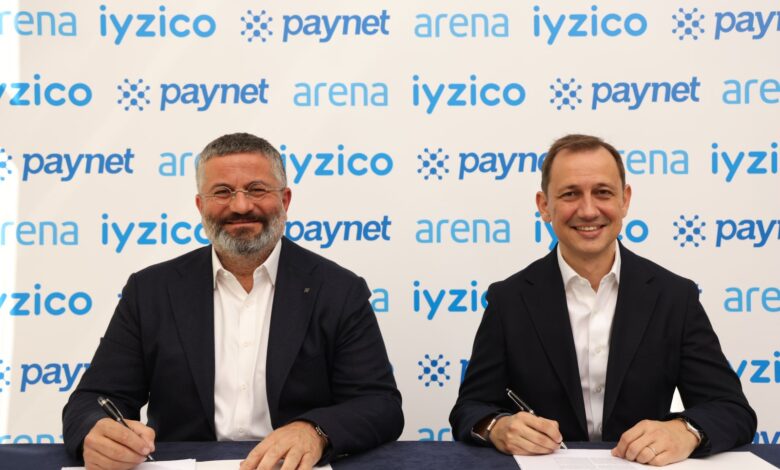Investment surge heralds dawn of golden year for fintech startups

The realm of financial technology stands at the cusp of an epochal transformation, with the landscape already adorned with record-breaking investments within the first four months of 2024. The trend sets the stage for what is all but sure to mark a golden year for fintech companies.
The surge has been spearheaded by substantial investments into Digipay and Midas, with the most recent acquisition of Paynet by iyzico further underscoring the vibrancy within the financial technology domain.
Ahmet Bilgen, an entrepreneur and angel investor known for his Foriba exit deal, highlighted the remarkable dynamism in the fintech industry.
“What truly catches my attention is the increase in transaction volume despite a decrease in investment amount! Yes, there’s a 16% decline in investment amount, but transaction volume is rising, with a 15% increase in the first quarter,” said Bilgen.
“This scenario offers significant insights into the future. Based on this data, we can affirm that the interest in fintech remains unabated. As I emphasized before, transactions and investments that peaked during the pandemic period were not sustainable anyway, and we expected the market to calm down and become more ‘rational,’ which it did.”
Midas, a fintech startup offering low commission rates for investing in American stock exchanges and Türkiye’s Borsa Istanbul, last month raised $45 million in a Series A funding round from global investors.
It marked the biggest ever Series A fundraise by a Turkish fintech and the second-largest early-stage investment on record.
In late February, Dgpays, one of Türkiye’s leading fintech companies featuring a software platform that provides payment and banking infrastructure to large companies, concluded its second round of investment at a valuation of $600 million.
Major acquisition
In a major deal within the fintech sector, iyzico, a provider of payment infrastructure for over 120,000 e-commerce sites and millions of end-users announced this week it had finalized the acquisition of Turkish financial technology company Paynet from Arena Bilgisayar for $87 million.
The acquisition hailed as the largest between two Turkish firms in the technology sector, bolsters iyzico’s position in the Turkish market, poised to play a pivotal role in the growth and development of the country’s fintech industry.
With a vast network of over 120,000 merchant members and 6 million individual users, iyzico anticipates enhancing its partnership with member businesses by integrating Paynet’s B2B and B2B2C payment and collection experiences, enriching its already diverse product portfolio.
Guiding growth
Orkun Saitoğlu, CEO of iyzico, which brought a new breath to the payments domain in 2013 and played a significant role in the growth of the financial technology sector, expressed optimism regarding the acquisition’s impact.
“This acquisition will expand iyzico’s product offerings, solidifying its position as a formidable player in the competitive financial technology sector. Aligned with Prosus’s global positioning and objectives, we outlined a medium-term strategy for iyzico on its 10th anniversary. With this strategy, we aim not only to guide the growth of our merchant members and provide complementary services in their digital transformation journey but also to enhance the end-to-end shopping experience for consumers and diversify payment options,” said Saitoğlu.
“This acquisition of Paynet and the incorporation of their expertise in B2B payment and collection into iyzico align perfectly with our existing strategy,” he added.
“We continue our journey with the vision of democratizing financial services and making them accessible to everyone. iyzico will continue to uphold this vision and lead the financial technology sector with the synergy created by the acquisition of Paynet.”
Türk Telekom launches next-day SIM card delivery system
In a bid to streamline its services and cater to the evolving needs of its customers, Türk Telekom, a leading telecommunications provider in Türkiye, has introduced a swift delivery system for SIM cards applied through its online platforms.
With an average delivery time of 24 hours in city and district centers across all 81 provinces, the initiative aims to expedite the process of acquiring new SIM cards or transferring existing numbers to Türk Telekom.
Embracing its role as a trailblazer in Türkiye’s technological and digital transformation, the company has thus eliminated the need for customers to physically visit stores to obtain SIM cards for new connections or number portability.
Through the Türk Telekom mobile application or website, customers can submit their requests and have their SIM cards delivered to their specified addresses within approximately a day. Upon arrival, a courier facilitates the identity verification process, enabling customers to promptly receive their new SIM cards.
Moreover, customers opting for the “Digital Fares” through the Türk Telekom application or website enjoy a special 15% discount.
By committing to a 12-month subscription, they also gain access to discounted rates on internet packages compatible with popular social media applications. Additionally, subscribers to “Digital Fares” receive a complimentary three-month YouTube Premium subscription, enhancing their video streaming experience.
AI giants under scrutiny: Debates on compensation, regulation heat up
In the wake of the ChatGPT explosion, the world grapples with decisions on regulating artificial intelligence. Startups are training their AI models by borrowing cloud credits from major data giants.
Leading the charge in cloud technology worldwide, behemoths like Microsoft, Amazon Web Services (AWS) and Google extend cloud credits to technology ventures for using their applications or building their own AI models. However, these credits, akin to those with OpenAI, circulate back as dependence on Microsoft. This situation is prompting new surveys to be conducted.
Calls for compensation
The Artificial Intelligence Policy Institute, a pro-regulation AI think tank, revealed that 60% of respondents in a recent survey believed that AI companies should not freely train on public data. Nearly three-quarters of respondents said companies should “compensate those who generate this data.” While 78% advocated for regulations regarding the use of public data to train AI models, there’s a slight partisan divide, with Democrats being slightly more inclined than Republicans.
Conducted online on April 12-13 with 1,039 participants, the survey marks the first attempt of AIPI, which has been a productive pollster since its launch last August, to gauge public sentiment toward AI companies’ data training practices. Policymakers are increasingly aligned with public concerns about the explosion in productive technologies. The AI has made data training an urgent policy matter.
Tax for electricity infrastructure
Participants also favored the idea of imposing a special tax on electricity for AI companies. About six out of 10 believed the government should collect revenue to “support and improve the electricity grid infrastructure.” Just over half of the respondents, despite partisan divisions, supported the fund proposed by the Biden administration for the AI Security Institute: 65% of Democrats compared to 47% of Republicans.
Demographic distributions in this round of voting largely align with previous rounds by AIPI. Older voters are more likely than younger ones to fear and demand regulation of AI, and despite some slight deviations, bipartisan consensus largely prevails.
Concerns shift with exposure to AI
In addition to regulation, participants were asked about their personal attitudes toward AI, including whether they were concerned about AI “soon” taking over their jobs and its potential to replace humans.
Surveyors asked the question as a two-part experiment, querying participants before and after playing “a blues song” produced by the AI music company Udio.
Initially, people seemed unconcerned about robots taking over their jobs. Only 31% said they were “very” or “somewhat” concerned about AI replacing their jobs. About 44% responded quite reluctantly, saying, “I’m not very worried.”
However, after listening to the music, attitudes changed; 45% said they were “very” or “somewhat” concerned.
A closer look at how responses changed reveals the tendency for exposure to productive AI to induce anxiety. It makes a significant impression, positively or negatively, on individuals. The direction of impact depends on education. It’s observed that university-educated participants showed a significant leap from pre- to post-listening. The “not worried at all” level rose from 21% to 39% among the educated, while among those without university education, the proportion of “somewhat concerned” increased from 13% to 30%.
Focus sharpens on venture capital investments by corporates
The second edition of the Corporate Venture Capital Conference, organized by the Entrepreneurial Institutions Platform (GKP) in collaboration with Özyeğin University and sponsored by Fiba Holding, took place this week under the banner of CVC Bosphorus’24.
Bringing together top executives from the investment world and corporate companies, along with nearly 500 participants from about 250 firms, the conference featured 26 speakers.
Following the opening remarks by Ihsan Elgin, the founder of the Entrepreneurial Institutions Platform and entrepreneurship adviser to Özyeğin University, a session featuring Hüsnü Özyeğin, founder and honorary chair of the Fiba Group, and Ömer Mert, CEO and board member of Fibabank, discussed entrepreneurship in the business world.
“In the business world, entrepreneurs typically navigate markets, sharing their business ideas with investors to secure financing. I follow a different approach. I identify successful business leaders who have spent years in professional management and convince them to become entrepreneurs. I call this ‘individual capital venture.’ When I bring the right people together and give them freedom, I know success will follow,” said Özyeğin.
Emphasizing the need for executives with an entrepreneurial and founder perspective in the business world, he said that in a rapidly changing world, the managerial approach satisfied with annual growth of 10%-20% is now outdated.
Rapid transformation continues
Özyeğin highlighted that successful entrepreneurship in the business world is also based on education.
“I believe universities need to establish stronger relationships with the outside world. We initiated the first entrepreneurship undergraduate program in Türkiye at Özyeğin University. When we look at the world, we see that future professions are undergoing rapid transformation. Therefore, this year, we are launching an undergraduate program at Özyeğin University aimed at supporting entrepreneurship and focusing on future professions,” he noted.
For his part, Mert discussed the contributions to Fibabank’s vision of digitalization and the value provided to ventures through their investments.
“During the pandemic, we witnessed rapid development in many startups. However, in the current environment, access to money has become much more difficult for ventures. Banks are adopting a cautious approach to providing credit to ventures. At Fibabank, we not only meet the financing needs of ventures but also support their growth processes with our knowledge and experience. We know that providing capital support to ventures is not the end. Our goal is to produce major global players from Türkiye,” he noted.
“The way for Türkiye to produce significant values lies in corporate venture capital firms joining forces and providing serious support to ventures. We call for collaboration to achieve this goal.”
Corporate venture capital on rise
In his speech, Elgin shared data on the corporate venture capital sector in Türkiye, noting that investments from corporations account for almost half of the total investments in the country.
He highlighted the growth of corporate venture capital and the importance of collaboration with other investment firms.
“Corporate venture capital investments have shown a steady increase in Türkiye since 2019. As of the end of 2023, there are 83 corporate venture capital firms. One out of every three investments is made by corporations. Looking at the investment amount, it is observed that approximately half of all investments come from corporate funds. Therefore, corporate venture capital should now be considered not as an auxiliary character but as a main character,” Elgin said.
“Ventures should also learn to work with corporations because corporate venture capital brings more than just money to ventures; it brings serious business experience and connections as well.”



